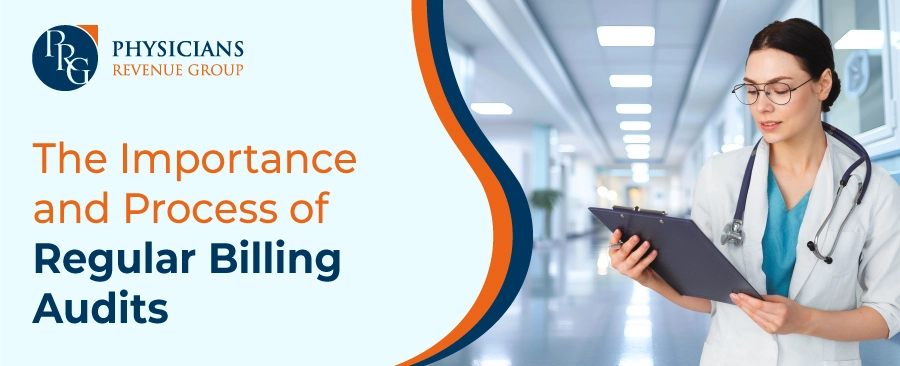
Email: info@prgmd.com | Call: +1 (630) 242-6474
Business hours: 9:00 to 5:00 | Monday to Friday
Email: info@prgmd.com | Call: +1 (630) 242-6474
Business hours: 9:00 to 5:00 | Monday to Friday

Table of Contents
TogglePlanning and conducting billing audits is necessary for a healthcare practice. A medical billing audit helps gauge the effectiveness and efficiency of claims and claim filings. The practical need and importance of regular billing audits have still not declined for the healthcare sector – even with the transition to ICD-10 coding.
For healthcare financial management, regular billing audits are organized processes that examine and evaluate the reliability and effectiveness of the clinical documentation. Billing audits thoroughly check out all health records of a medical practice and review the billing data submitted to payers for ensuring that the healthcare practices:
-all inappropriate medical billing practices. As almost all aspects of billing can affect the bottom line, highlighting the compliance issues is essential.
A healthcare practice for regular billing audits might be requested to submit the following:
Clinical records, including:
Financial records, including:
Auditing is a familiar process, especially in medical billing. Regular billing audits ensure that all medical records follow the standard industry rules, an essential aspect of healthcare financial management.
The medical billing process encompasses several areas, including:
For billing audits, these checkpoints are essential. Regular billing audits enhance the flow of the claim submission and reimbursement processes to a greater extent. This proactive approach ensures financial efficiency and reduces the likelihood of errors in various billing components.
The billing audit process is a series of steps to ensure the financial health of your practice and HIPAA compliance in medical billing. Let’s delve into the process and understand its importance.
Following the evaluation step, use the audit results strategically. This involves:
It’s a proactive approach to enhance revenue cycle management and improve patient care outcomes.
Make regular audits a standard practice. If your practice manages medical billing in-house, conduct an internal billing audit at least once a year. Larger practices may opt for more frequent audits, possibly every three months. Regular audits ensure ongoing financial efficiency and help identify and rectify issues quickly.
The billing audit process is a recurrent approach involving determination, evaluation, adaptation, and repetition. Regular billing audits are essential for sustaining your practice’s financial health and achieving long-term success.
Having an in-house team is a common but somewhat outdated approach for medical audits. This internal team conducts audits on random records as needed. However, establishing a plan from the start is key. Each audit should involve:
An internal audit team can save time and effort, ensuring a well-prepared approach to the audit procedure.
Moreover, internal audits offer a personalized touch. The team understands the needs of your practice, making the audit process more tailored. By consistently reviewing internal processes, your practice can efficiently identify and address potential issues.
On the other hand, another option is outsourcing billing audits to specialized companies like Physicians Revenue Group, Inc. Such external auditors follow a standardized process applicable to various practices. They can pinpoint operational flaws and suggest improvements by evaluating your billing procedures against industry benchmarks.
Outsourcing brings an external perspective, offering a fresh set of eyes to identify areas for enhancement. Additionally, external audits often bring industry expertise and align your practice with the latest billing trends and regulations.
Internal and external audits play vital roles in maintaining the financial health of your practice. While internal audits provide a personalized approach, external audits bring an objective viewpoint and industry insights. The choice between the two depends on your practice’s specific needs and resources. Regular billing audits, whether conducted internally or externally, are essential for your practice’s constant improvement and nonstop success.
Share:
Categories
Recently Added

What is an ABN in medical billing?

What does a Clearinghouse do During Claims Submission?

What is EOR in Medical Billing?
We Would Love to Assist You!
We treat your data confidentially and don’t share any information with a third party.